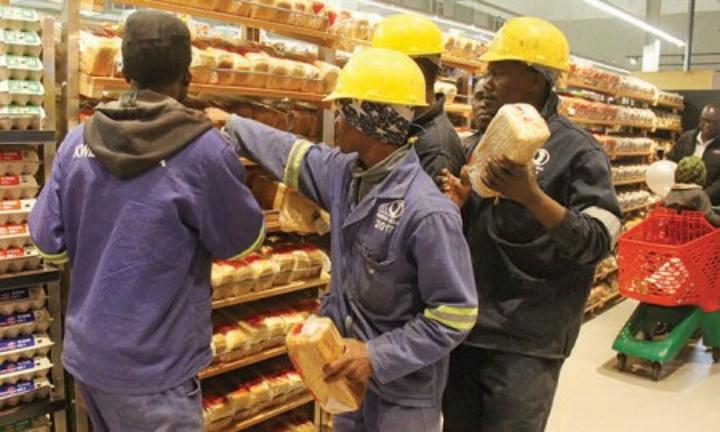Africa-Press – Botswana. The novel coronavirus (COVID-19) and its impact on supply chains has invigorated debate around import substitution and local industrialisation. Will campaigns such as #PushaBW and Buy Botswana overcome powerful, established imports and the resistance by some local consumers? Staff Writer, MBONGENI MGUNI reports
It’s one thing to get a product onto the shop shelf. It’s quite another for a buyer to sift through competing products and choose that particular one.
In some countries such as South Africa, the competition on the shop shelf ultimately benefits both the consumer and the government. The majority of products there are made in South Africa and though some companies lose out to others on the shelves, consumers have a wider choice, pricing benefits and government ultimately gets its ‘tax’ cut. Jobs are created and sustained, innovation is enhanced, and best practices are constantly sharpened.
In Botswana, however, simply getting a product onto a shop shelf is a huge deal. It is not easy convincing local retail chains, many of them with South African roots, to place your product and even if it does find space, it is up against imported brands, sold cheaper, marketed more aggressively and so well established to the point of being household names. The country’s historically small industrial base has operated in the shadow of powerful regional entities and resisted multiple government-led efforts over the decades to grow.
In this regard, analysts are agreed that COVID-19 has, ironically, helped. The pandemic rocked regional supply chains, forcing all countries to look at their own needs first before exports. South Africa, in fact, introduced export permits for certain products, to protect the country’s own needs. The two main government-backed import substitution and industrialisation campaigns, #PushaBW and Buy Botswana, have suddenly found extra wind in their sails this year and Batswana have responded patriotically. “There has been quite a change and it can be seen on social media, around supporting local enterprises,” says Botswana Cement Manufacturers Association executive director, Nkosi Mwaba. “We have been talking for a long time about Batswana not trusting the quality of local products; the view that it’s your cousin making cooking oil and you’ll never buy it. But now you can see we have been helped by the situation COVID-19 has put us in. “There’s a lot of support for local products and we are learning to be self-reliant in a lot of things. “That spirit needs to continue.” While enthusiasm among consumers is only now growing, the government has been leading from the front for years. Since 2010, the government has institutionalised local procurement as a policy under the Economic Diversification Drive (EDD) programme. Through a presidential directive, all arms of government are required to purchase goods and services locally where they are available, cost-effective and meet tender specifications.
As the biggest customer in the country, the government’s procurement budget runs into billions of pula each year. The EDD idea is to foster local industrialisation and value chains through procurement, thus helping diversification, employment creation, innovation, capacity and ultimately lowering poverty and the reliance on imports.
The programme has not worked as desired and in 2019, Investment, Trade and Industry officials said it was ‘stagnant’ and only accounting for 53% of government procurement. The initiative has also been dogged by several challenges. “We have seen business capacity constraints, unreliable supply, uncompetitive pricing, limited range of products and imports of similar goods to complement a running tender,” Ellen Galetshetse, principal commercial officer at the EDD Unit told a recent Buy Botswana workshop. “With imports of similar goods, you find someone with a tender to produce 1,000 tables only producing 200 then importing 800 similar ones and supplying them as if they produced them. “This practice is widespread on the ground and we see it. We order from a manufacturer and they go around the corner and import. “This will not grow your business or the industry.”
The EDD is currently being revised and it is reported there is debate around penalising public officers who flout local procurement rules, a sign that government is getting fed up with the ‘stagnant’ policy.
The private sector, which is the economy’s other major procurer, has been criticised for being reluctant to support #PushaBW, Buy Botswana and local procurement in general. Apart from the mining sector, which launched a
local procurement initiative in 2015, the private sector has generally been non-committal on supporting local enterprise in terms of goods and services. “As a government, we have seen that the private sector does not support each other and in the current EDD we have no power to do anything about that,” Galetshetse said. “Maybe when the EDD is revised, it will come up saying we have the power to say the private sector must support each other.”
Sello Motseta, Buy Botswana and Thought Leadership Conference patent proprietor, says many of the procurement decisions made in the private sector are not necessarily guided by standards criteria but are instead arbitrary. “There are structural weaknesses like in the local retail outlets,” he says. “Many Batswana are selling vegetables in the back of vehicles and at roadsides because the retailers argue about standards. “When you talk to the buyers you find that a lot of them don’t have set criteria and it’s about the fact that these retailers come from South Africa and prefer their own Proudly South African products on the shelves.”
Motseta continues: “There’s also a lot of dumping. They bring their excess products here and drop the price, making it very difficult for local producers or suppliers. “So you have issues of market access and pricing. “Government must be alive to these issues and protect local producers and suppliers with tariffs.” Motsetsa says local enterprises are running the risk of being “swallowed up by globalisation”. “There’s a misunderstanding about the concept of a free market,” he says. “Theoretically it’s there but there’re no absolutes. “Even in the US, which advocates for free markets, they protect their industries and it defies belief why Botswana cannot do that. “Next year, we will have a sustained campaign around Buy Botswana building up to the main event.” For Botswana Telecommunications Corporation Limited managing director Anthony Masunga Buy Botswana is about building businesses and in turn growing local wealth. “For us to grow wealth in Botswana, we have to build our own enterprises and sustain them,” he says. “When there’s a disconnect between the economic structure of a country and its people, there is bound to be strife. “We see it happening in South Africa, in Zimbabwe and even here it may happen if that disconnect widens.”
Investment, Trade and Industry minister Peggy Serame, whose mandate includes local enterprise development and the EDD policy, has a huge challenge on her shoulders.
Serame’s predecessors fought running ‘battles’ with the private sector for greater shop shelf space for Batswana products and services. The development of a mall in Mochudi once stalled after the then trade minister insisted on enforcing a reservation policy for Batswana enterprises engaged in certain trades. South African retail chains have since then been under increasing pressure to open up their shelves to local producers and suppliers via greater procurement.
“Due to COVID-19, we struggled to get products into the country and we have seen people more comfortable with getting local products onto the shelves,” Serame says. “We are also being very aggressive about #PushaBW and we also have the market streets to say ‘these are your local suppliers, let’s engage and you tell us where they need to improve for your standards’. “We continue to engage with the retailers to understand their point of view and see what can be done.” Serame says her dream is to see a mall dedicated to local products and services, where Batswana and others can find what they need under one roof.
“I remember previously in a foreign country, we went to a five-storey mall and I asked myself why I couldn’t see brands like Nike, Adidas and others. “The people there said floors one to three are only for local products. “I’m hoping that as long as I am here, we will have that shop for local products in Botswana.”
The many Batswana entrepreneurs, enterprises, those established and those only starting all rallying under the #PushaBW and Buy Botswana umbrella, share the same dream.






